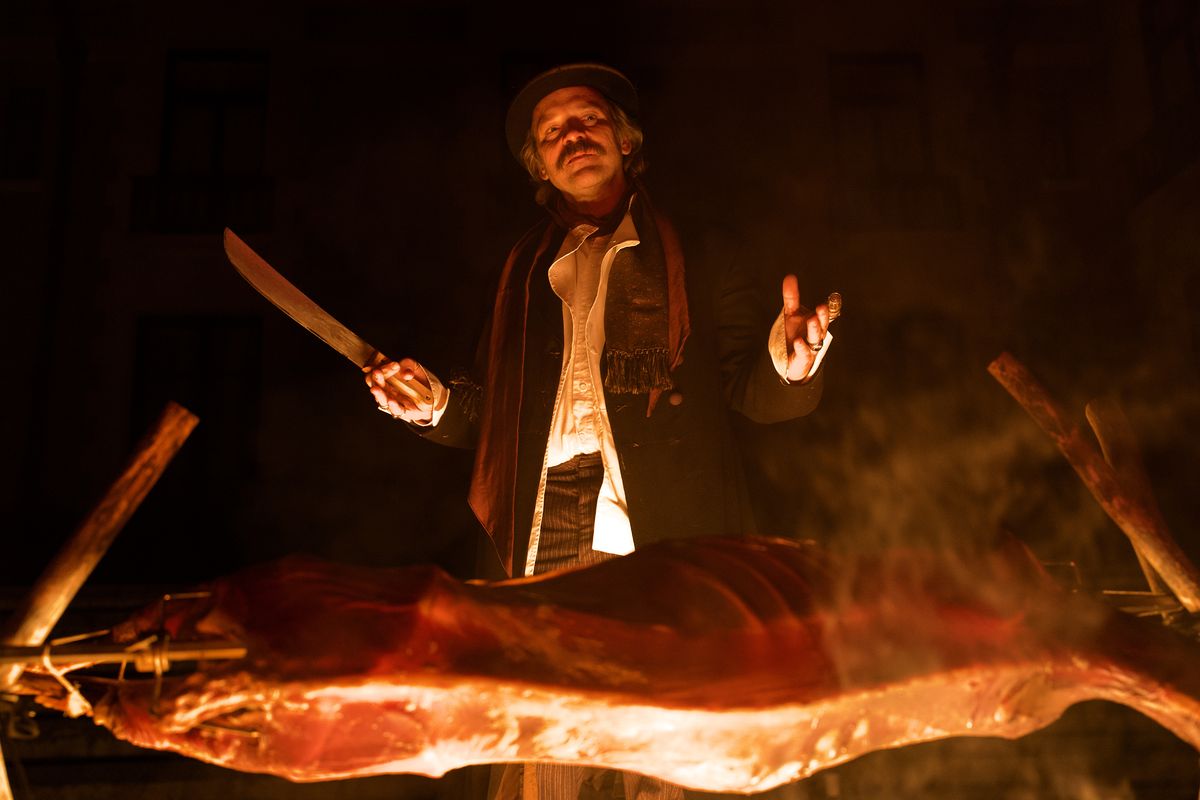Movie review: ‘Coup!’ a tasty morsel of social commentary

At the end of 2020, there began a wave of films that spoke to the COVID-19 pandemic, either explicitly, or through the limits of their production. Some films addressed the quarantine and lockdown and the way that our lives changed, while others simply told stories with just a few people in a single location, easier to film safely.
But four years out from the onset of the pandemic, there are now films that speak to the 2020 pandemic by taking on another pandemic, a century ago, the 1918 influenza pandemic. “Coup!,” written and directed by Joseph Schuman and Austin Stark, is a sprightly class satire set during this era, though the issues it tackles feel all too timely, which is something all good period pieces should strive to do.
The 1918 setting throws questions of race and class into stark relief in this story, which is unhindered by the complex political issues of 2020. But one of the film’s antiheroes, Floyd Monk (Peter Sarsgaard) speaks plainly as to what the 2020 pandemic taught us when he tells his employer’s wife, Julia (Sarah Gadon), that, “nature has a way of creeping into the modern world, bringing out the beast in some and the beauty in others.” Many would agree that the turmoil and fear of the pandemic and lockdown revealed some of our basest human instincts and tendencies, in ways with which we are still grappling.
Monk’s employer is one Jay Horton (Billy Magnussen), a wealthy trust fund kid and proud muckraker. He’s holed up with his family and servants at their palatial estate on Egg Island, waiting out the pandemic, while hammering out fiery newspaper columns demanding the government shut down businesses to protect the working class from the spread of influenza. We meet Monk as he assumes another man’s identity and makes his way to the island to present himself as the Horton family’s latest personal chef.
But while Monk cooks up vegetable-forward meals for the staunchly plant-based Horton, he also seizes the opportunity to foment rebellion among the household, starting with the staff. A diverse group made up of an African American governess (Skye P. Marshall), a Turkish driver (Faran Tahir) and an Irish housekeeper (Kristine Nielsen), Monk himself is a veteran of the Spanish-American War with a vaguely Louisiana accent; he has no purchase for the rules of Horton’s home, especially when the lord of the manor is such an obvious hypocrite.
The writer rattles off missives condemning the Wilson administration and falsely positioning himself at the center of protests in New York City, all while ensconced in luxurious isolation, waited on hand and foot. Monk instantly chafes at the hierarchies imposed in the Horton home, and when the island is cut off from ferries and grocery stores are closed, the household becomes dependent on the cook to provide. As the home devolves into something like “Lord of the Flies,” our hedonistic interloper uses this opening to become a usurper.
“Coup!” is a clever metaphor using this one home to represent a microcosm of society and the 1918 pandemic to speak to our current realities that see a lower and middle class becoming resentful of the hoarding and hierarchies established by a ruling class — especially an intellectual ruling class who speak out of both sides of their mouth, arguing for progressive causes and workers’ rights, while enjoying the spoils of their own privilege.
Sarsgaard and Magnussen are two terrifically embodied actors who are quite skilled at what they do, and which they do here specifically very well: Magnussen the pompous, self-important rich boy, Sarsgaard the earthy, sly, seductive trickster. The wonderful thing is that the actors could swap roles and both would still excel. Gadon plays the feminine foil to both actors with ease.
Shot by Conor Murphy with a woodsy glow that evokes the luxury of the grand manor’s interiors and infused with sepia-tinted vintage quality that indicates the period setting, there’s a richness and warmth to “Coup!” that belies the rather cynical and cutting nature of the story. While there are few elements of the narrative and extra characters that are left at loose ends, and therefore feel extraneous, they aren’t necessary for the communication of the central themes and ideas of class warfare and hypocrisy. Anchored by typically strong performances from Magnussen and Sarsgaard, “Coup!” is a tasty morsel of social commentary about the problems that continue to plague our world.